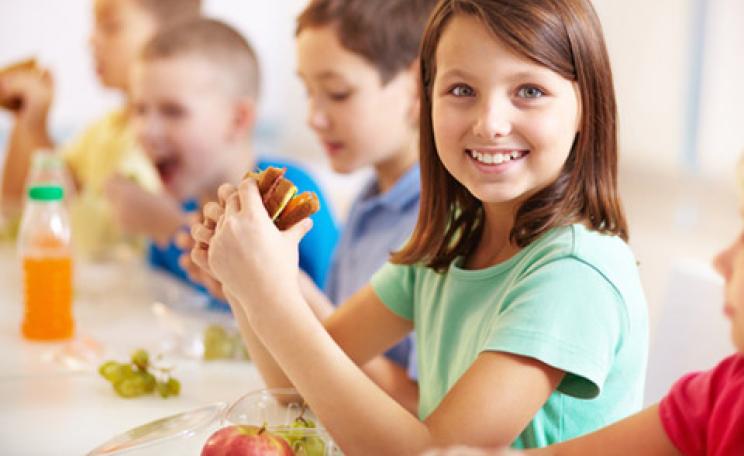It’s mad that the Government could allow school meals to be ruined, even as they’re talking up their childhood obesity plan. It’s mad that children living in poverty could be denied a healthy, hot school meal. It mustn’t be allowed to happen.
Everyone is talking about Brexit. Leave or Remain? Deal or No Deal? Amidst all this political turmoil, school cooks and caterers up and down the country are working hard serving children with healthy and high-quality hot school lunches. But they are facing ever greater challenges.
I was a school dinner lady in the 1990s and early 2000s. School meals were chronically underfunded. Caterers and cooks were working hard, but against tremendous odds. The food often wasn’t up to the quality of today.
We’ve come a long way since then. In 2003 I teamed up with the Soil Association to launch the Food for Life campaign. Jamie Oliver then joined the battle for better school meals, mandatory nutrition standards were agreed, and Universal Infant Free School Meals were introduced. Today, more children than ever before are enjoying a good school lunch. But all that is under threat.
Quality alternative
Food for Life is launching a ‘State of the Nation’ report on children’s food this week. The report includes interviews with cooks, caterers and other stakeholders that reveal a cocktail of pressures and challenges that threaten school meals, with a disorderly ‘No Deal’ Brexit threatening to be the final straw.
Caterers have faced sharp rises in ingredient costs this year. The costs of some fresh fruits and vegetables have risen by up to 20 percent. Staples such as pasta, cheese and yoghurt have also risen steeply. One caterer reported that eggs are up 14 percent.
On top of this, caterers have had to handle the introduction of the Living Wage, the Apprenticeship Levy, and rising pension contributions. One local authority caterer is facing an increase in staff costs of £330,000 this year due to the introduction of the Living Wage.
All the caterers that I’ve spoken with are working hard to maintain the quality of school meals, tweaking menus and buying in more cost-efficient ways. But for many, the numbers don’t add up.
Cold ‘pick and mix’ lunchbox options are being introduced instead of hot meals. “This year will be the tipping point for school meals,” one caterer told me. “Pressure is mounting on expenditure and cold meals will be the result.”
Healthier items such as fresh fruit are being reduced on menus and replaced with cheaper alternatives. Salmon is also being reduced and replaced on menus. Caterers are being forced to source lower quality ingredients. One caterer said that tens of thousands of pounds will be saved by switching from a locally sourced cheese to a lower quality alternative from abroad.
Political priority
Caterers raised a question mark over the spend of school meal budgets, including the £2.30 allocated to each meal served under Universal Infant Free School Meals. Some caterers were concerned that local authorities might be ‘siphoning’ off funds for school meals to plug black holes in their budgets elsewhere. Local authorities have faced challenging cuts in recent years and the budget for school meals isn’t ringfenced.
Among the caterers who expressed concern was one who said that they already paid ‘central charges’ to the local authority, covering payroll and procurement, of over £1 million per year, but this was increasing by £200,000 this year alone.
It’s mad that the Government could allow school meals to be ruined, even as they’re talking up their childhood obesity plan. It’s mad that children living in poverty could be denied a healthy, hot school meal. It mustn’t be allowed to happen.
In parallel, spend on ingredients was being cut, even as ingredient costs were rising. The only way they could make ends meet was to source lower quality produce.
This is a difficult situation, but Brexit could make it far worse. Earlier this year, the House of Lords European Union Committee warned that if an agreement cannot be negotiated, a disorderly ‘No Deal’ Brexit is likely to result in an average tariff on food imports of 22 percent.
While this would not equate to a 22 percent increase in food prices, it would exacerbate existing price rises as 30 percent of the UK’s food comes from the EU.
Grown and cooked
A sudden and significant increase in ingredient costs, hitting caterers overnight, would be impossible for many to handle.
Over the years working with Food for Life, I’ve visited schools across the country and I have seen more and more children who are hungry and for whom a hot school meal is their only hot meal of the day. Now those hot meals could be replaced by cold options.
We might not know how Brexit is going to turn out, but the Government can still take action to protect school meals. To begin with, they should ringfence the budget for school meals and provide greater oversight on their spend.
Funding for school meals should be spent on school meals – is that so much to ask? They must place greater political priority on school meals, and the Healthy Rating Scheme for primary schools promised in 2016 should be introduced.
In the meantime, Food for Life will continue to work with schools (and hospitals, care homes and universities) across the UK to make good food the easy choice, reconnecting people with where their food comes from, teaching them how it’s grown and cooked, and championing the importance of well-sourced ingredients.
This Author
Jeanette Orrey a children's food campaigner and former school 'dinner lady' who in 2012 received the MBE for her services to food in schools.






